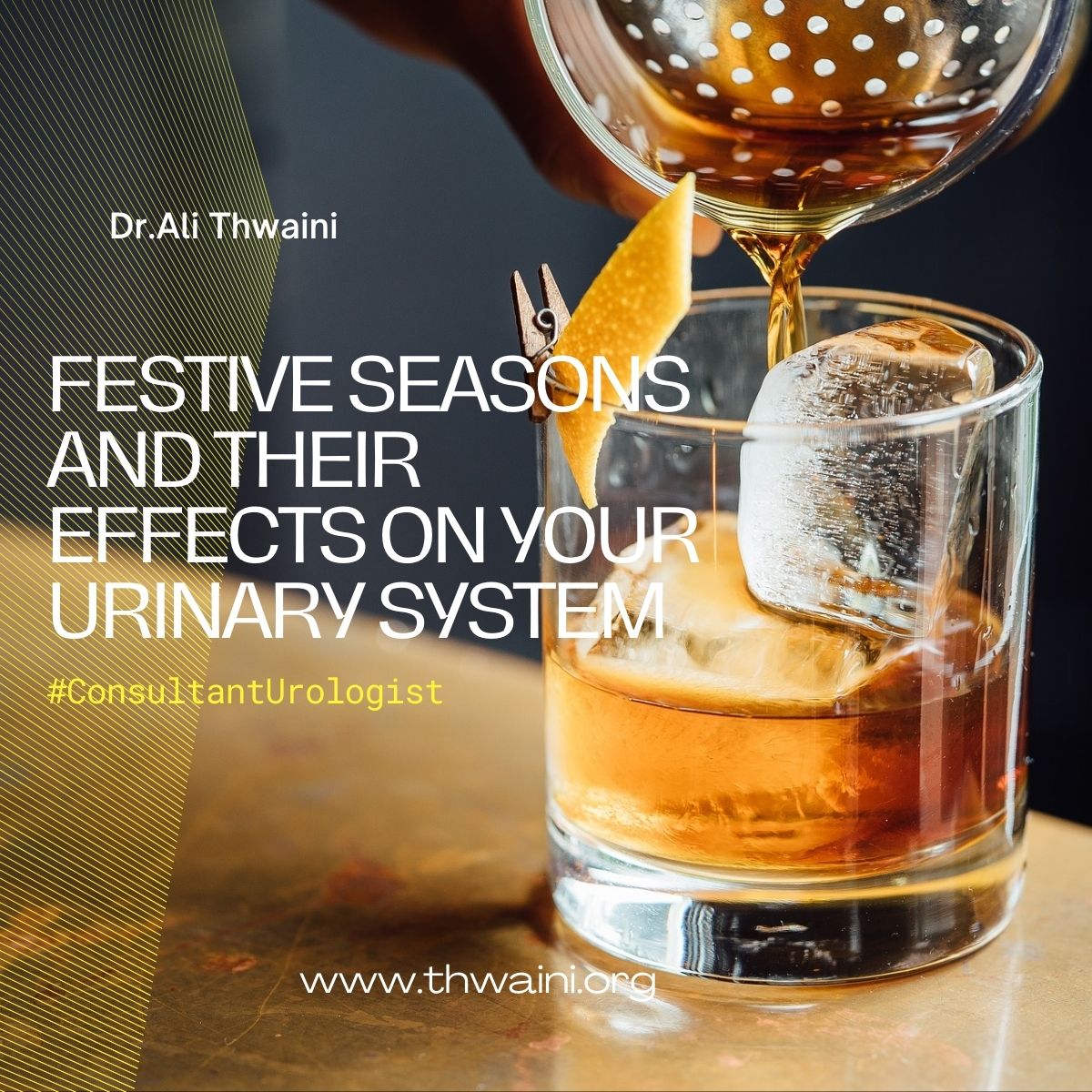Christmas has just passed and we are still in the partying mode, preparing for the new year. It’s been tough couple of years with yet another wave, albeit less virulent, of COVID’s new disguise; Omicron.
We are on the verge of winning our war against it. It’s indeed worth the celebration. One has to be careful though with the effects of alcohol on our urinary system. The Celebration should not be at the expense of our health and the safety of people around us. Here are some facts about alcohol and its effects on our urinary system.
The effect of Alcohol on the kidneys:
Alcohol alters the filtration function of the kidneys adversely resulting in the reduction of its efficacy, thus rendering them less able to filter the blood.
Alcohol also affects the ability to regulate fluid and electrolytes in the body. It has a natural diuretic effect leading to frequent visits to the toilet after many drinks. This, however, leads to intracellular dehydration, resulting in loss of excess fluid and an Increase in electrolyte concentration in the body.
Regular heavy drinking has been found to double the risk of chronic kidney disease, which does not go away over time. Even a higher risk of kidney problems has been found for heavy drinkers who also smoke.
The Centers for Disease Control estimates that most American adults (two out of three) drink alcohol. Too often, some of these regular drinkers have more than five drinks at one time. In fact, about a quarter of drinkers reported they had done this on at least one day in the past year. “Binge” drinking is even worse. It has harmful effects on the kidney that can even lead to acute kidney failure. A sudden drop in kidney function is called acute kidney failure. This often goes away after a time, but it can occasionally lead to lasting kidney damage.
Added to that is the effect of chronic drinking on the increase in blood pressure resulting in different levels of kidney damage with protein loss in the urine.
Studies have demonstrated the effects of chronic alcohol intake on the cellular structure of the building brick of the kidney; The nephron. It’s been shown that the basement membrane of various aspects of the nephron develops an increase in its thickness, therefore hindering its ability to perform its filtration and concentration functions properly.
The effects of alcohol on the urinary bladder:
Alcohol has a double adverse effect on the urinary bladder: It has a strong diuretic affect leading to excessive frequency and urgency.
It will also lead to dehydration resulting in more concentrated urine, which causes burning of micturition by the concentrated urine.
It has been shown previously by various experiments when the bladder gets distended, the intravesical pressure increases to a peek after which (especially in situations not permitting paying visits to the toilet) the pressure drops down simply due to the thinning of the bladder muscle. This results and the reduction and pressure necessary to generate in order to empty the urinary bladder (law of Laplas).
Also, chronic alcohol intake leads to nerve damage resulting in “alcoholic cystopathy”. This would potentially lead to the current urinary retention.
In summary:
Drinking can be fun in certain cultures, let’s be honest. Excessive alcohol intake can lead to injury, accidents, serious embarrassment and long-term health problems. Even drinking small amounts of alcohol increases your cancer risk.
There are a few tips for those who would enjoy having a drink with their family and friends.
- Eat before drinking to minimize the direct effect of alcohol on your body.
- Drink plenty of water.
- Don’t mix alcohol with sugary or energy drinks.
- Avoid salty snacks – they will make you thirsty and likely to drink more.
- Be in control of the number of drinks you take: Set yourself a drinks limit and stick to it. Avoid drinking in rounds (especially with friends who drink too much). Try to finish your drink before you start another, rather than topping up your glass.
- Slow down when you drink: To keep safe, slow down your drinking to 1 drink per hour. You can do this by:
- drinking non-alcoholic drinks as well as alcoholic drinks
- drinking water to quench your thirst before you start drinking alcohol
- opting for low-alcohol drinks. sipping rather than gulping
Wish you a Happy New Year
References:

